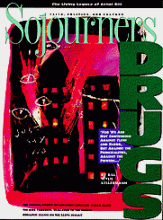The struggle for equality in the church has taken several leaps forward and a significant step back in recent weeks. The U.S. Catholic bishops, in a highly publicized draft report on "women's issues," refused once again to stand up against the Vatican's ban on women priests.
The pastoral document, which will go before the whole body of American bishops in June, condemned sexism in society as a "moral and social evil" and said the church should examine its own "practices, possessions, power structures, and lifestyles" for repressive aspects—but held on to the male-only priesthood.
"Since the bishops are in the position of not extending the fruits of baptism to all people," feminist theologian and author Sister Madonna Kolbenschlag told Sojourners, "they shouldn't be saying anything about women—only about sexism and patriarchy. I don't think women can take seriously anything they say about women."
On a brighter note, the first women priests in the Anglican Church in Australia were ordained in March by Archbishop Peter Carnley of Perth, who declared, "Today we ordain 10 women, but we liberate tens of thousands." Six weeks before the historic ceremony, Dawn Kenyon—who had been ordained a priest in New Zealand in 1987—was installed as Australia's first woman rector in a mining-community parish east of Perth.
Read the Full Article
